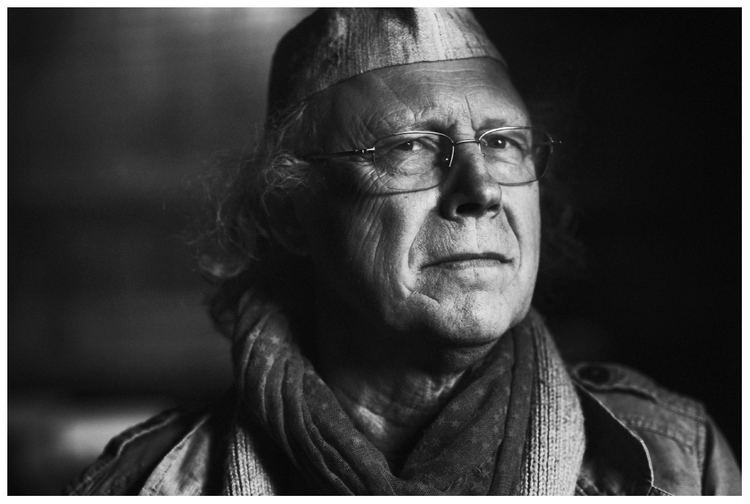Normally, when people think of a record released on ECM, they think it’ll be something staid, Nordic and pastel sounding. Not without good reason, either. They’ve released a ton of albums like that by artists like Jan Garbarek or Terje Rypdal.
But back in the day, ECM was a genuinely exciting jazz label that released odd, compelling records. I’m thinking of genre-bending combos: Azimuth, Gateway Trio, Circle, and Codona, for example. But one of the most interesting releases of theirs is also one of their most overlooked. It’s time to change that.
Bengt Berger is a Swedish musician and an ethnomusicologist.
Over the decades, he’s studied music all over the world, but in the late 70s, he was into traditional forms of music coming out of Ghana. In January 1981, he enlisted a large ensemble to record his arrangements of a number of traditional African tunes. The resulting album, Bitter Funeral Beer, is a compelling mix of slow world music, frantic percussion, and avant-garde jazz.
It opens with the title track, eight minutes of chanting, moaning, and sparse percussion. A few minutes, saxophones join in the chorus and about halfway through, Tommy Adolfsson’s trumpet picks up. It’s a slow, churning track, aptly setting the mood here: jazzy, yes, but with a foot set in Ghanaian music.

However, “Blelete,” is probably more what listeners would think of as world music.
It’s a taught, driving rhythm from a chorus of drums. “Chetu,” meanwhile, is built around a lurching, circular rhythm and Don Cherry’s stuttering blasts of pocket trumpet. When the percussion kicks in about halfway through, it builds up to an impressive groove.
Cherry was an inspired choice for this project: over his long career, Cherry played with everyone from John Coltrane to Lou Reed, making music that basically refused to be held to a single genre. With Codona – a trio with sitar player Colin Walcott and Brazilian percussionist Nana Vasconcelos – he made early stabs at world music, however in a more subdued and introspective vein. Perhaps that association was what led Berger to think of him here; but his presence is a critical element of Bitter Funeral Beer.

The first side closes with “Tongsi,” where Cherry’s shrill pocket trumpet solos and leads the band in a theme against a chorus of percussion: drums, xylophone, etc. It builds to a wonderful call-and-response climax, reminiscent of the chanting from “Bitter Funeral Beer.”
The second half of the LP is a lengthy medley of “Darafo/Funeral Dance.”
It opens slowly, with strings and an almost bluesy chord progression, but after a few minutes works into a percussion-heavy groove with several reeds playing in unison. There’s a nice saxophone solo from (according to a Discogs contributor) Jörgen Adolfsson that twists and turns around the rhythm. Later, Cherry takes a few choruses with his trumpet. But the key to this is the compelling groove the band builds up: the drums and percussion slowly build, keeping the music moving forward with a palpable energy. Late in the album, everything else falls away except for the drums, which seems fitting: they’re what drives this record and makes it so exciting.
One could make a compelling case an album like this is gentrifying a traditional music. Rather than be recorded in Ghana, with Ghanaian musicians, Berger recorded in Stockholm with a case of mostly European musicians. That argument isn’t wrong , and it raises a good point: Berger was inspired by the music he heard in Africa and re-arranged it for a Western audience.
But at the same time, albums like this showed both his – and, to their credit ECM’s – desire to bring this style to a wider audience, to expose jazz fans and other open-eared listeners to styles of music they were unlikely to come across in 1981. And it’s worth noting Berger studied under several musicians while in Ghana. He was a serious student and musician, not a tourist who heard something on the radio. Regardless, it was only a few years later that Fela Kuti broke through in America with Army Arrangement and a slick video showing his incarceration; his funkier, English-language grooves soon defined the “world music” genre.
Nearly 35 years after it’s first release, Bitter Funeral Beer still holds a compelling power.
All the ECM hallmarks are there, from the sharply recorded percussion to the sense of space in the ambience, but musically it’s unlike anything else on the label. It crashes and rushes at the listen and it slowly worms it’s way in. It’s an interesting introduction to a style of music that’s a world apart for the average listener. And, somehow, it’s all but out of print.
ECM is generally pretty good about keeping their back pages available, but in this case it’s slipped through the cracks. You can find it digitally on Amazon, but good luck finding a hard copy: even the CD is going for over $50 on the secondary market right now. Still, for anyone interested in African music, avant-garde jazz and places the two meet, this record is essential.
For more information/records, or to just look at cool photos of this band, do check out Berger’s website.



